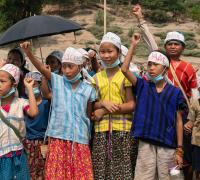How does violent conflict affect climate change dynamics?

A lot of research has been done on the climate-conflict nexus, but most attention has been given to the question of whether climate change can ignite or worse existing conflict dynamics, linked particularly to contestations over scarce natural resources. At Folkemødet’s International Arena, Helene Kyed drew on MyClimate research to flip the question around, asking: how does violent conflict, as seen currently in Myanmar, affect climate change dynamics? It does so in at least three important ways.
- Violent conflict affects the potential escalation of slow-onset climatic changes, as war economies and displacement increase deforestation and uncontrolled extractive activities, like mining, that harms the environment.
- Violent conflict reduces the capacity of local farmers and communities to cope with the effects of climate change, such as changing farming methods and dealing with natural disasters. Ongoing conflict can also hamper access to humanitarian aid during disasters caused by climate change. This was evident during the recent Mocha Cyclone, which hit the northwestern part of Myanmar.
- Violent conflict shapes the politics of climate change – that is the discourses, policies and practices done in the name of climate change – in multiple ways. Climate change may be mobilized by violent actors and repressive, authoritarian regimes to legitimize their rule and their extractive activities (done e.g. in the name of conservation and mega-projects linked to green transition). Conversely, environmental activists, indigenous organizations and oppositional governments also appropriate the language of climate change to protect their territories and environment from encroachment by violent and authoritarian actors.
International agencies engaged in climate change support should take these dynamics into account in their programs, rather than approaching climate change solutions and problem definitions as simply technical matters. There is also a need to democratize support to climate change, by involving local organizations and populations, rather than rely predominantly on state-centric and top-down approaches. This is not least relevant in contexts with violent conflict and authoritarian rule, as is the case in Myanmar.
Helene Maria Kyed presented together with her colleague, DIIS senior researcher Ninna Nyberg Sørensen, a long-time expert in international migration, who recently commenced a large research project on ‘Complex Pathways of Climate Mobility for Children and Youth in Ethiopia.’
Folkemødet is a Danish public event where different organizations, politicians, companies and the media engage with various societal debates. It provides a fertile environment to share research findings to the general Danish public.
DIIS Experts


